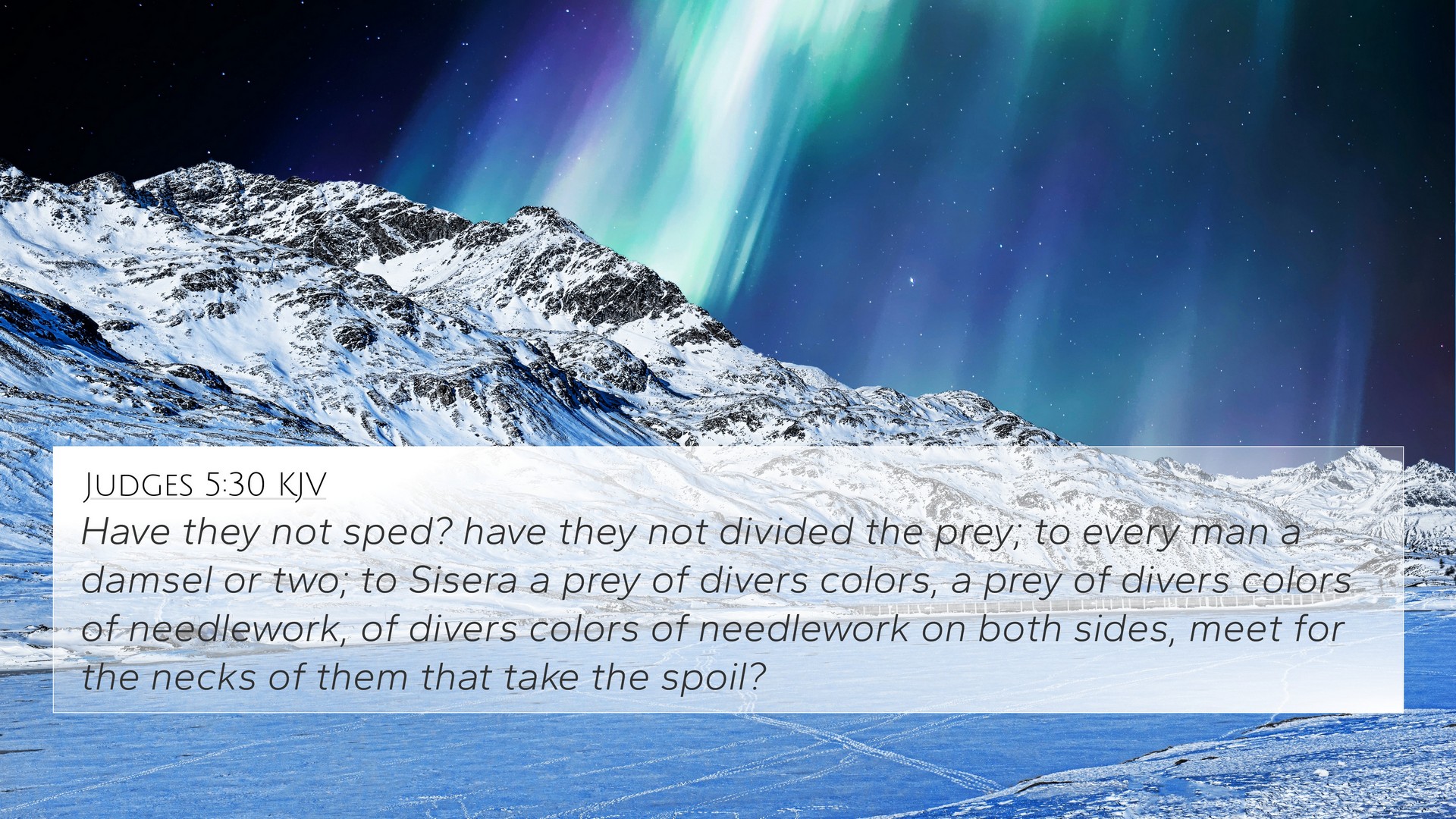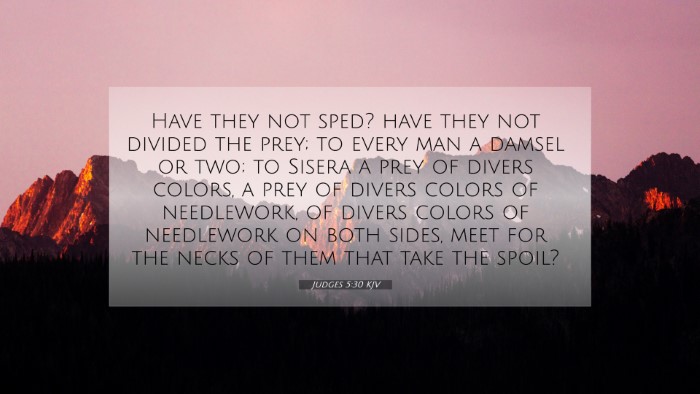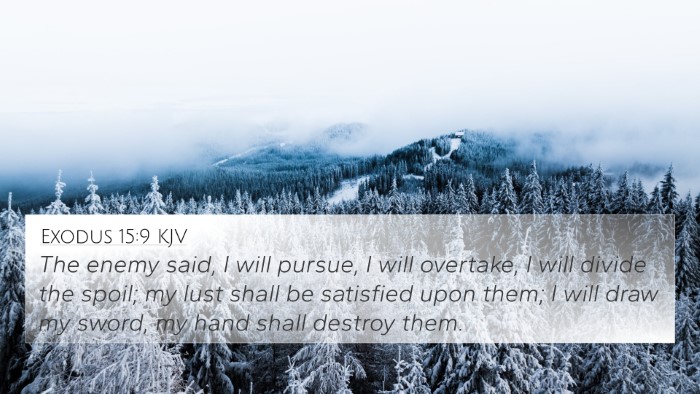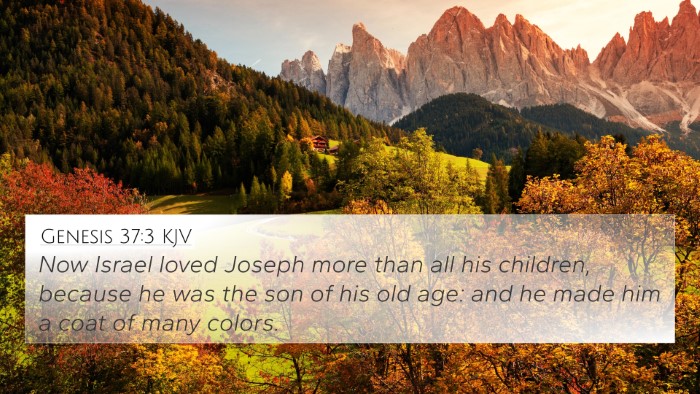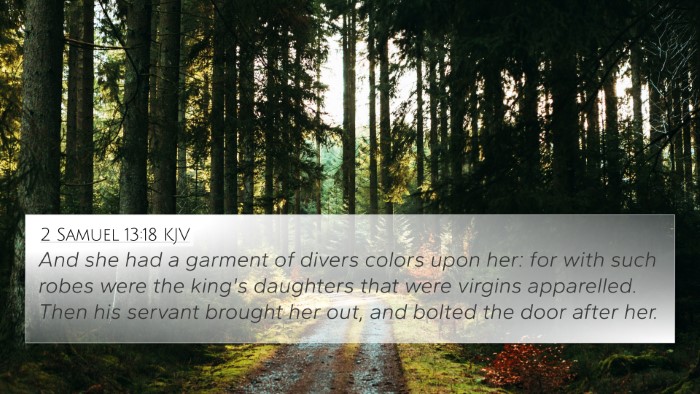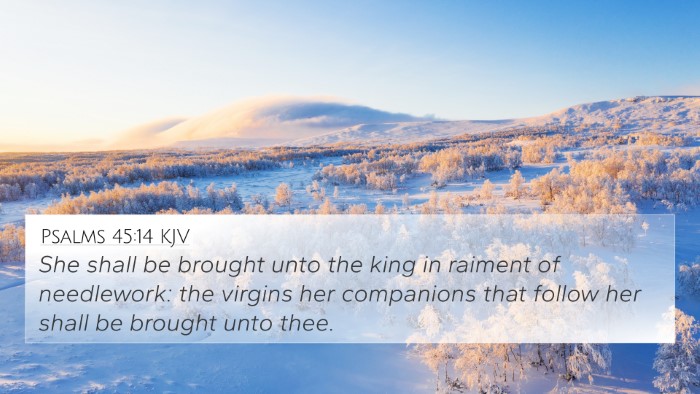Bible Verse Meaning: Judges 5:30
Judges 5:30 states: "Are they not finding and dividing the spoil? A maiden or two for every man; to Sisera a spoil of divers colours, a spoil of divers colours of needlework, of divers colours of needlework on both sides, meet for the necks of them that take the spoil."
This profound verse comes from the Song of Deborah, which celebrates the victory of Israel over Sisera and his army. It reflects the exuberance of the Israelites in victory and the traditional spoils of war that would be divided among the soldiers.
Analysis and Interpretation
The commentary from Matthew Henry emphasizes the delight and jubilation of the Israelites as they recount the treasures acquired from their enemy.
- Joy of Victory: The verse highlights the great joy and pride of the Israelites regarding their triumph, focusing on the spoils obtained as evidence of God's favor and assistance.
- Reflection of Culture: It illustrates the cultural practice of sharing spoils and signifies social status as warriors bring home tokens of victory.
- Women in Focus: The mention of "a maiden or two for every man" reflects the post-war societal practices where women were often taken as spoils, an element critiqued in modern interpretations.
Comparative Insights
Albert Barnes discusses the particular mention of the varied and richly colored garments, symbolizing the wealth and luxury of Sisera’s army, further underscoring their defeat and disarray.
Adam Clarke notes the poetic structure of the verse, emphasizing how it serves not only as a historical recount but as an artistic expression of gratitude to God for their deliverance and victory.
Bible Cross-References
This verse has several connections to other scriptures, enriching the understanding of its meaning:
- Isaiah 9:4: "For you shall break the yoke of their burden..." - both verses reflect themes of victory over oppression.
- Psalm 68:12: "Kings of armies did flee apace, and she that tarried at home divided the spoil." - similar imagery of spoils in battle.
- Deuteronomy 20:14: "But the women, and the little ones, and the cattle, and all that is in the city, even all the spoil thereof..." - discusses the cultural norms surrounding the spoils of war.
- 1 Samuel 30:24: “For as his part is that goeth down to the battle, so shall his part be that tarrieth by the stuff: they shall part alike.” - emphasizes communal sharing of war outcomes.
- Revelation 19:14: "And the armies which were in heaven followed him upon white horses..." - here the theme of divine victory finds its application in eschatology.
- Proverbs 16:18: "Pride goeth before destruction, and a haughty spirit before a fall." - an ironic contrast to Sisera's pride in battle.
- 2 Corinthians 2:14: "Now thanks be unto God, which always causeth us to triumph in Christ..." - connecting divine assistance in our victories.
Thematic Connections
The overarching theme in Judges 5:30 is the celebration of victory that is acknowledged throughout Scripture. Below are various thematic connections across both the Old and New Testaments:
- Victory: Many verses celebrate God's deliverance, such as Exodus 15:1-18 with the Song of Moses.
- Justice: Isaiah 61:2 argues for the year of the Lord's favor, resonating with the sentiments of justice in battle.
- Divine Providence: Psalm 126 reflects the joy of return from captivity, which parallels the joy of victory in Judges.
- Glory of God: 2 Thessalonians 1:10 illustrates the manifestation of God's glory in the triumphant outcomes of His people.
Conclusion
In summary, Judges 5:30 not only serves as a narrative of a historic event but enriches our understanding of God's power in delivering His people and the importance of recognizing and celebrating such divine interventions. By examining the connections and themes through cross-referencing Biblical texts, deeper insights emerge leading to a richer understanding of scripture as a whole.
